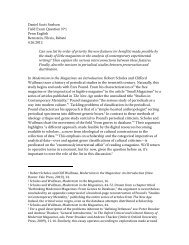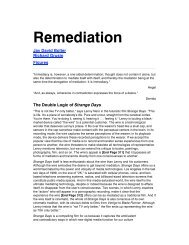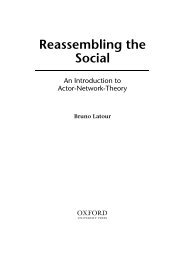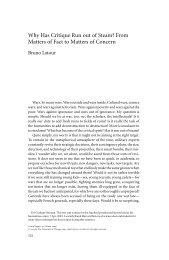The Exploit: A Theory of Networks - asounder
The Exploit: A Theory of Networks - asounder
The Exploit: A Theory of Networks - asounder
Create successful ePaper yourself
Turn your PDF publications into a flip-book with our unique Google optimized e-Paper software.
6 Prolegomenon<br />
instances “accidents” or networks “out <strong>of</strong> control” is a misnomer. <strong>The</strong>y<br />
are not networks that are somehow broken but networks that work too<br />
well. <strong>The</strong>y are networks beyond one’s capacity to control them, or<br />
even to comprehend them. At one moment the network appears far<br />
too large, as in the global dynamic <strong>of</strong> climate changes, but at another<br />
moment it appears too small, as with binary code or DNA. This is why<br />
we suggest that even while networks are entirely coincident with social<br />
life, networks also carry with them the most nonhuman and mis -<br />
anthropic tendencies. Indeed, sourcing the nonhuman within the<br />
human will be a major theme <strong>of</strong> this book.<br />
So let us first outline a few provisional responses to the foregoing<br />
queries. While each is a useful cognitive exercise, we hope to show<br />
how each response is ultimately unsatisfying, and how a new approach<br />
is required for understanding the exceptional quality <strong>of</strong> sovereignty<br />
in the age <strong>of</strong> networks.<br />
Provisional Response 1: Political Atomism<br />
(the Nietzschean Argument)<br />
Action and reaction, force and counterforce—the argument can be<br />
made that the United States’ decisions to declare war on terrorism or<br />
to intervene in the Middle East do not take place in a political vacuum.<br />
Perhaps the global machinations <strong>of</strong> “Empire” have elicited an<br />
American ressentiment in the form <strong>of</strong> unilateralism, a nostalgia for<br />
the good old days <strong>of</strong> the Cold War, when war meant the continued<br />
preparation for a stand<strong>of</strong>f (never to arrive) between technologically<br />
advanced power blocs. Thus each advancement toward a decentralized<br />
global Empire consisting <strong>of</strong> France, Japan, Russia, and other leading<br />
industrialized nations is met by an American counterclaim to regain<br />
a singular world sovereignty.<br />
However, this implies that, in contradistinction to the United<br />
States, the international community represented by the United Nations<br />
is the vanguard in the global political scene. <strong>The</strong> problem is<br />
that the very concept <strong>of</strong> a “united nations” is fraught with complication.<br />
On the one hand, there exists a romantic desire for a political<br />
tabula rasa, in which the many inequities between nations can be<br />
effaced by the “general will” <strong>of</strong> an international community. Yet on









